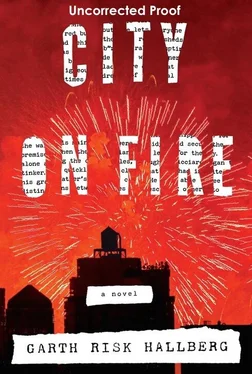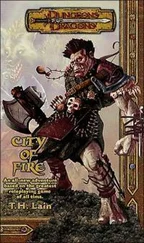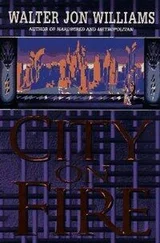She can’t recall the last time no servants were here. She has to go all around the perimeter opening cabinets just to find glasses, and when she turns on the faucet, nothing comes. They’re on the seventeenth floor, and there’s no power to draw the water up. She can feel the boy’s eyes on her back. In the unlit fridge she finds a pitcher, dips a finger in to taste. “Is lemonade okay? It’s lukewarm.”
“It’s fine,” he says. His face is flushed. Then: “Why are you doing this?”
“I don’t know,” she admits, but she has this feeling of knowing him from somewhere. She should ask his name. Instead, she pours herself a dram of the Grand Marnier she’s discovered in her tour de cabinet. It’s nauseatingly sweet, but on the plus side goes straight to her head. The boy sets his camera on the counter. They sit in complicated quiet for a minute or two. Then she asks what he thought he was doing down there on the street—“if you don’t mind my prying.” When he doesn’t answer, she takes another sip. “I mean, I’m sure you have your reasons. Most people do. But you’re not sleeping out there, right? Because people get mugged. The streets are wild.”
His gaze is unsettling, so she turns and starts shutting the doors of the cabinets she’s opened. “I speak from experience here. Our kids got lost on the way home from day camp tonight, and we must have walked ten miles looking for them, my husband and I. But I keep thinking they must have gone somewhere safe.” There’s a little desk where the cook can sit down and write out menus, and on the hutch above are picture frames, including another of the million prints of that photo from Lake Winnipesaukee. She hands it to the boy. “This is them.” He has the kind of fair skin that goes pink with the slightest stirring of blood.
“Wait. This is your husband?”
“Ex-husband. Or almost. We’re separated. He was supposed to pick them up.” Then the oddest thing happens: the boy reaches for her glass, and for a second, their fingers are in contact. When she lets go, he dumps what’s left of the Grand Marnier into his lemonade. Bolts it. Closes his eyes and doesn’t speak for a minute. “We should all just go home,” he says at last.
“Beg pardon?”
“You said this isn’t your place, right? A kid will always want to go home.”
“Are you okay? You’re a little pale.”
They look at each other for a minute. Of course she knows him, she thinks. He has lost someone, too. They are the same, he and she. “Can you show me the phone?”
The telephone cupboard is a little velvet-cushioned room under the stairs. The boy shuts the folding glass doors carefully behind him, and she retreats to a far doorway for discretion’s sake. Through the galaxies of flame on the glass, she can see his slouched shoulders, his face turned toward the wall. I’m in this rich guy’s house, he might be saying into the receiver. Bring the duct tape and the guns. But she feels certain he’s talking to a parent. Asking, she thinks, to be picked up.
“Your turn,” he says a minute later, emerging even more rumpled than before.
“What?”
“Your kids,” he says. “Call home. Keep calling.”
She catches herself about to explain to this boy all the reasons calling an empty apartment again defies logic. But what is there to do, really, besides take the receiver and squeeze past him into the cupboard? Its interior now smells like Will’s gym socks. She’s just pulling the door shut when he reminds her about the radio. “With batteries. You promised.”
“There’s an exercise room a few doors down that hall. I think there’s one there.” And then the boy is gone, and Regan’s sending herself through the little holes in the earpiece. Each ring is a rock dropped in dark water. Leaden circles, nine or ten, spreading outward without striking anything solid. But then, incredibly, there Will is, and the thing he says is not hello but “Mom? Is that you?”
His voice sounds blurry somehow, as if explosions inside have fogged her hearing. Still, he is oxygen; the air could not be full enough of him. “Will, baby, where are you? Jesus.”
“Uh … you called me, remember?” But she’s called so many places tonight that she’s already forgotten which one this is. “The new apartment? Tall building? Big water? Ringing any bells?”
“I mean, where have you been all night? Is your sister all right? I’m just ill about this, we’ve been looking—”
“Cate’s asleep in your bed.” Aschleep. “We’re fine. Geez, if you want to be pissed at someone, be pissed at the person whose fault this is.”
“I want you to stay put,” she says, surprised at her own firmness.
“It’s like four in the morning, Mom, where would we go?”
“Stop that. No more of that. I’m leaving Grandpa’s as we speak.”
“What are you doing at Grandpa’s? Is he okay?”
“Everything’s fine, but I can’t say how long it’ll take your father to find us a cab.”
“Dad’s there?”
“Of course Dad’s here.” She once heard someone describe space orbit as a continuous freefall. His silence now is a little like that, she’s falling through the universe in her little glass capsule. Then she strikes something solid: Keith. It’s Keith he’s been mad at all this time. “Honey?”
“I don’t see why he has to come. He’s the one who stood us up in the first place.”
“Will. Your dad loves you more than anything.” Again that pause, as she realizes it is true. “We both do. Be a little human here.”
“Fine. But if I’m asleep when you get in, don’t wake me. It’s been a hell of a night.” He hangs up, and for once, she is thankful for Felicia Gould’s excess, for the fantasy of elegance she forced on everyone around her, for now the door can be kept shut as long as Regan needs. She doesn’t know why she’s still so afraid to let other people hear her cry, except that presumably the sun is going to rise here at some point, and the world of the past, which has not looked kindly on displays of naked emotion, will reach out to touch the world of the future, like an aerialist finding the next trapeze, or a sleeper remembering herself as she awakes.
When she tracks down Keith, he is on one of those spiral staircases in the great hall, coming down from the second floor. He’s started to report that her father’s sawing logs, and William reading, when she calls out across the open space that she’s finally reached them.
“In Brooklyn,” she says. “At the new place.”
He sits down right there, a few steps above the parquet.
“I told Will we’re both on our way. I figured you’d want to see them,” she says.
His eyes are at exactly the same level as hers, separated only by the openwork of the staircase. He does want to see them, he says. Very much.
This means leaving Regan’s runaway to wait for his ride. William can look after him, make sure he doesn’t steal any of the silver, but she feels she should at least tell him they’re leaving. Which is something she has to do on her own, she says, determined for some reason to keep him and Keith from crossing. If her husband has objections, he doesn’t raise them. (Is this how things are going to be now? And is that bad or good?)
Earlier, she thought William was putting her on, pretending not to remember his way around the penthouse, but dimness has rearranged the side-passages, and for a minute she gets lost herself. Then a radio is chirping up ahead, and after two closets and a cigar room, she finds the fitness center. The candlelight hits a nautilus machine and a treadmill and not one but two scales. Their shadows on the walls look like tools for the mortification of the flesh. There’s a moment when she almost feels sad for Felicia. Then she spots the boy. He’s on a wrestling mat on the floor, his legs tucked up under his chest and his head down next to the radio, like one of those Muslim cabbies you see hauling flattened cardboard out of the trunk at prayer time. It’s what he was doing on the bench outside, she realizes: beaming his requests toward Mecca or wherever.
Читать дальше












